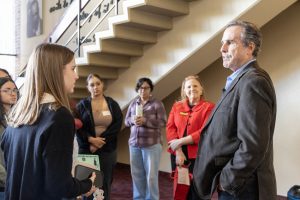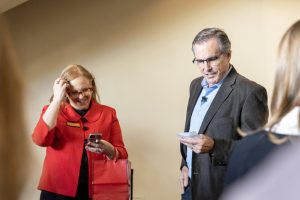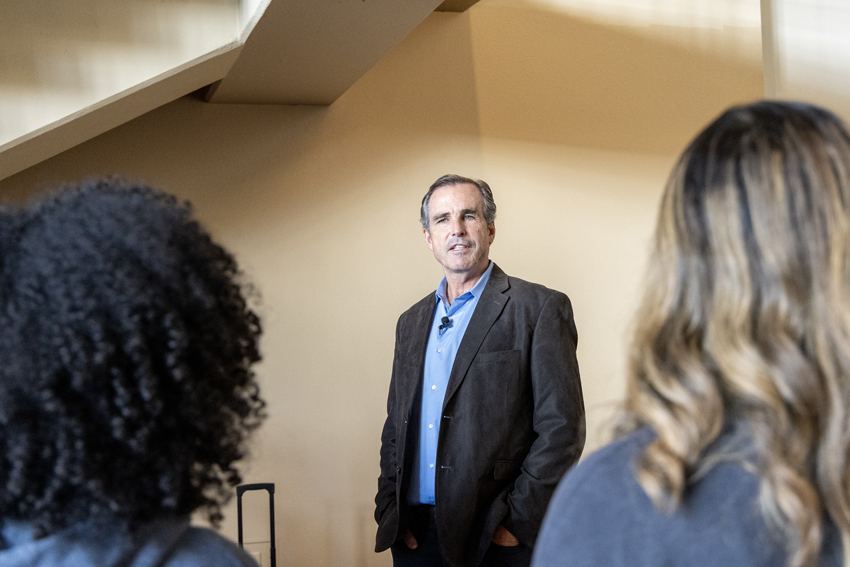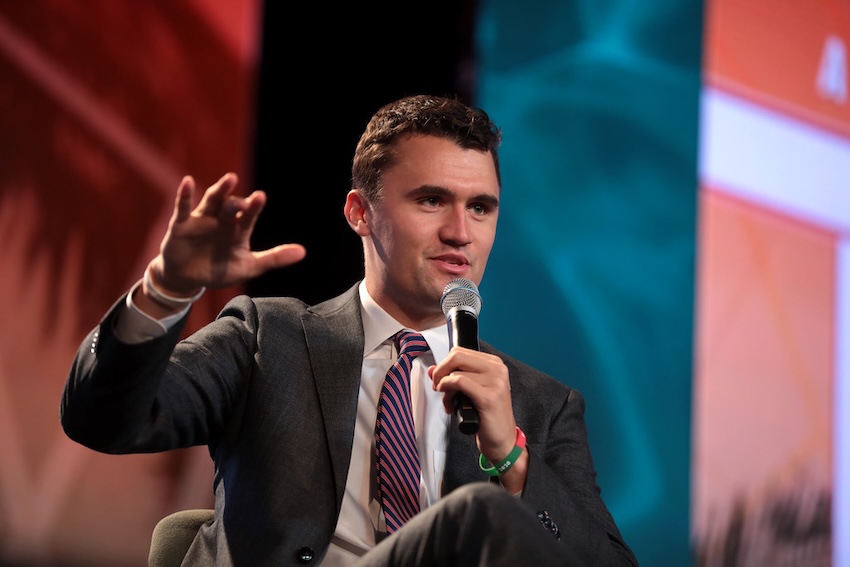In an instant, the improvised explosive device, an IED, was detonated. Just a few seconds is all it took for journalist Bob Woodruff to experience a life-threatening event in Baghdad, Iraq. Now, Woodruff speaks about his journey from life as a lawyer to an ABC reporter in a region ravaged by war at San Joaquin Valley Town Hall, Oct. 15.
In Fresno’s William Saroyan Theatre, seats were packed with people who listened to Woodruff’s story. He wasn’t always a news correspondent for ABC; he first worked for Shearman & Sterling, LLP in New York City. During this time, he gained the opportunity to teach international and American law in Beijing, China.
While he was in Beijing teaching, CBS hired him as an on-screen interpreter during the 1989 protests of Tiananmen Square. He witnessed the subsequent massacre of protestors, sparking his curiosity in conflict journalism. Woodruff and his wife were forced to leave China for their safety where they settled in San Francisco, California.
While in San Francisco, Woodruff began to lose his “heart” for law and kept looking back at Tiananmen Square. Before working for ABC, he began as a reporter for local stations including Redding, California. There he gained the necessary skills to be a national reporter for “ABC’s World News Tonight.”

Woodruff joined the organization in 1996, covering major stories such as the 9/11 events while he was at the London Bureau for ABC. He and his coworkers watched the moment when the second plane hit the South Tower on the news.
“I saw the second plane hit, live on TV,” Woodruff said. “And we all looked at each other and said, ‘this is Osama Bin Laden.'”
After seeing this, Woodruff got on the last plane from London to Pakistan. He was one of the first Western reporters in the Middle East to cover the conflict and the fall of the Taliban. For 17 weeks, he stayed in Pakistan and Afghanistan reporting, later returning to his family in London and moving back to New York.
When working in New York, Woodruff began covering the Iraq war. In March 2003, he traveled with a division from the Marines as the U.S. invaded Iraq and moved towards Baghdad. For safety and ABC protocol reasons, Woodruff returned from the Middle East, where he succeeded World News Tonight anchor Peter Jennings after he lost his battle to lung cancer.
Woodruff and his cameraman, Doug Vogt, were assigned to cover the conflict in Iraq. The pair arrived in the capital city of Baghdad, where they moved north into Taji. Woodruff and Vogt joined mid-operation where they were placed in a tank to go along the route. The pair stood outside the top of the tank where the Iraqi gunner who was with them turned and said, “You should get down. This is a dangerous IED area”. It was just three seconds later when the device was detonated on the left side of the road.
An IED is an improvised explosive device, which has had significant usage during the Iraq War in both Iraq and Afghanistan. Also known as roadside bombs, these devices can include truck bombs, pipe bombs and devices triggered by another device, such as a cell phone or hand-made detonators. Woodruff recounts the few memories he has from that experience, including the brutal injuries he sustained.
“If I didn’t have a helmet on, which would be long off at the time,” Woodruff said. “If I didn’t have body protection, I would be dead.”
In the last few seconds of consciousness, Woodruff asked his producer who was inside the tank, “Are we still alive?” The producer responded with “You’re still alive.” Woodruff was told later that the soldiers with them got out of their vehicles just as gunfire broke out and began to fire back at the terrorists.
Woodruff received a myriad of injuries including head, face and neck, and suffered skull fractures and severe brain trauma. Immediately, he and others were airlifted in a Black Hawk Helicopter to Balad Air Base with a field hospital. There, he underwent an emergency surgery to relieve pressure on his brain and remove fragmented debris. Woodruff thanks the doctors and nurses who performed on him for saving his life.
Following this, Woodruff and Vogt were flown to Germany as the news of the incident was passed along to his wife. After several days in Landstuhl Regional Medical Center, the pair was transported to Bethesda Naval Hospital in Maryland for further surgery and his recovery process.
To control the brain swelling and repair his skull damage, doctors medically induced Woodruff into a coma lasting 36 days. The steps of recovery would be a long few months for him. Woodruff considers himself to be a “pretty blessed person,” but not a miracle.
Being in Bethesda, Woodruff saw that the VA, Veterans Affairs, was not fully prepared to help all the wounded veterans at that time. Him, his wife and his brother sought to fill that gap of what the family could do and what the government could do. They started a foundation, the Bob Woodruff Foundation, to help veterans all across the country.
Inspired by the resilience of military families, the Woodruff family sought to aid the nation’s veterans and service members. Woodruff works around the nation to help wounded veterans and encourage those in the recovery process.
“Some of the most important things around are your family and your friends. The double F,” Woodruff said. “If you’ve got those, then you have a much better chance of recovering. I think that’s the number one thing, you need friends around you. You need family around you… Just don’t ever be secluded. Don’t bury yourself to be all alone because that’s the one that makes the recovery very, very slow.”

In 2007, Woodruff and his wife, Lee Woodruff co-wrote “In an Instant,” a bestselling book recounting the family’s journey of love and resilience. Woodruff still is present on ABC news and journalism, making his return just 13 months after his injury. Since returning, Woodruff traveled countless times to Asia as ABC’s main correspondent there, including traveling to North Korea and China.
Woodruff focuses more on long stories, documentaries and projects especially ones pertaining to veterans, global issues and traumatic brain injuries. He and his family shine a light on the needs of wounded servicemen and women after returning from wars and give their support through the Bob Woodruff Foundation.
Part of the ABC News documentary, After the Blast: The Will to Survive, Woodruff returned to Iraq 18 years after the incident with his son, Mack Woodruff. They traveled to the exact road in Taji where the blast occurred, where he recounted the memories he had.
Woodruff’s journey is a beacon for others struggling with challenges of their own and remains a testimony of strength and perseverance. He not only brings an inspiring story of resilience but gives a foundation and a voice to the wounded, the struggling and the forgotten.
To read more from The Feather, visit Fresno Christian choirs performs annual Fall Choir Concert 2025 and FC Girls Varsity volleyball players hit career milestones







